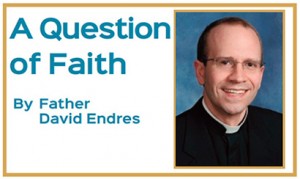Fr. David Endres – Question of Faith – December 2016
 My mother is in her mid-80s and would like to know if viewing Mass on television fulfills her obligation to attend weekend Mass. Getting to church is not easy for her, but she drives herself to the grocery and to get her hair done. She also has children that would be willing take her to Mass. Is it permissible for her because of age and health?
My mother is in her mid-80s and would like to know if viewing Mass on television fulfills her obligation to attend weekend Mass. Getting to church is not easy for her, but she drives herself to the grocery and to get her hair done. She also has children that would be willing take her to Mass. Is it permissible for her because of age and health?
The Church has long emphasized the importance of Sunday Mass, considering it as a weekly celebration of Easter in which the Christian faithful are fed by the Word of God and the Eucharist. In 1998 Pope John Paul II issued the Apostolic Letter Dies Domini (“The Lord’s Day”) in which he called for a renewed effort “to keep Sunday holy, especially by sharing in the Eucharist and by relaxing in a spirit of Christian joy and fraternity” (paragraph 7). The importance of honoring the Lord’s day, especially through Sunday Mass attendance, is even more urgent today. While we often consider aspects of our faith life to be private, Sunday worship is a necessary communal expression of faith, an experience that is particularly beneficial and unique from various forms of personal prayer.
It is for this reason that Church law expresses the necessity of participating in Mass on Sunday or Saturday evening unless a “grave cause” prevents it. One can imagine scenarios in which Mass attendance is not possible and such a “grave reason” legitimately exists: no access to Mass because of a lack of a priest in a given area and significant distance to the nearest church where Mass is offered; personal sickness or necessity of caring for an ill family member; or an unavoidable work obligation.
Still, we recognize that missing Mass is in many cases not truly necessary and frequently opportunities for Mass abound from Saturday afternoon through Sunday evening. To willfully miss Mass when participation at the Eucharist is possible is a serious sin.
While it is difficult to judge the degree of infirmity necessary to constitute missing Mass, one’s ability to participate in other activities can serve as a guide. If one is able to leave the house for other activities, one is usually well enough to attend Mass. If one’s mobility is limited, then relying on the help of family, friends, or neighbors to attend Mass is encouraged, and those who can assist the mobility-limited in attending Mass are asked to give a generous response to those who need their help. Many parishes help facilitate Mass attendance for those who can no longer drive themselves.
Even if absenting oneself from weekend Mass is necessary, the Church encourages individuals to take part in the Liturgy of the Word through private or communal reading of the Scriptures from that weekend’s liturgy. Viewing Mass on television can be spiritually advantageous as a means to participate in the Liturgy of the Word and to join in the prayers of the Mass, but it does not substitute for Mass attendance. Mass on television does not allow for a true participation in communal prayer, nor the reception of the Eucharist.
Since the Eucharistic liturgy alone provides us with the opportunity to be fed by the Scriptures, to offer ourselves to Christ, and to receive Him in Holy Communion – and not individually, but as a community – every effort should be made to be present on Sundays, unless we are truly unable.













